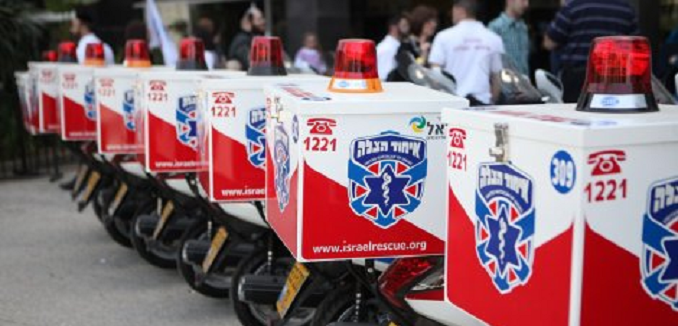When people think of Israel, so often the word “conflict” comes to mind, yet the reality is far more complicated than news reports make it appear. Despite the conflict – or perhaps because of it – Israel has one of the most advanced systems in the world for saving lives. As Jared Kushner crafts his comprehensive peace strategy for a “shared society” for Israelis and Palestinians, he should note some harrowing statistics that reflect tragedy but actually offer the hope of facilitating coexistence.
Terror statistics in Israel are heartbreaking. From the state’s founding in 1948 through the end of 2017, 1,362 terrorist attacks resulted in 3,699 dead and 14,734 injured. These numbers are shocking when compared to the United States, where over the last thirty years, the average death rate per million from terrorism is 0.44, compared to Israel’s 11.9.Furthermore, though Israel is also known to have many fatal accidents, ambulances take about twenty minutes on average to arrive at the scene.
Yet there is a silver lining. One extraordinary organization, United Hatzalah, has leveraged technology and some 5,000 people to save an awe-inspiring number of lives – Jewish, Christian and Muslim, Israeli and Palestinian. “Hatzalah” means rescue in Hebrew, and the organization provides rapid, professional, pre-ambulance emergency care with a record-breaking average response time of three minutes and in major cities, often 90 seconds. Its free services operate 24 hours a day, seven days a week, and its volunteer emergency responders include Jews, Muslims, Christians, Arabs, Druze and Bedouins.
Hatzalah fulfills its mission using “ambucycles,” retrofitted motorcycles that act as mini-ambulances and are equipped with a trauma kit, oxygen canister, blood-sugar monitor and defibrillator. Ambucycles are not meant to replace traditional ambulances, but they can shorten the time it takes EMTs to provide first aid and life-saving support. Eli Beer, who founded the organization, calls it “a lifesaving flash mob.”
Ten years ago, Hatzalah created an Uber-like app for emergency responders. Using a standard smartphone GPS, the system draws a perimeter around an incident and alerts the five closest volunteers through a series of loud beeps on their phones. Anyone who identifies an emergency can call a toll-free number in Israel that is routed to the United Hatzalah nerve center, which blasts out the alert.
As a result of its unique mission and the single-minded focus of its founder, United Hatzalah has become the most financially successful Jewish or Israeli nonprofit founded since the turn of the century. According to Charity Navigator, which provides financial information on charities, the organization has an annual budget of about $15 million dollars, the vast majority of which goes directly to funding life-saving equipment and training volunteers. This is a testament to the value the organization’s donors place on savings lives – be they Muslim, Christian or Jewish – and making the world a better place.
United Hatzalah has chapters not only in East Jerusalem, whose population is heavily Arab, but in three predominantly Arab Israeli cities: Tira, Kafr Kana and Kafr Qasim. It also has a total of some 450 Arab and Bedouin volunteers of various faiths – Druze, Christian and Muslim – throughout Israel, who wear vests with United Hatzalah logos in Arabic and English. Today, both Jewish and Arab volunteers answer calls in Jerusalem, in Arab cities within the Green Line, and even in West Bank towns that each group normally considers to be dangerous. “We started hand in hand,” says Beer. “Arabs were saving Jews. Jews were saving Arabs. Something special happened … it’s an unbelievable situation . . . all of a sudden they had a common interest.”
United Hatzalah has helped break down preconceived notions and stereotypes among the volunteers. People who would normally never interact with members of one of the other groups –ultra-Orthodox and secular Jews, Christians, Muslims, Bedouins and Druze – now work together. There is “so much tragedy, so much hate. It’s not about saving Jews. It’s not about saving Muslims. It’s not about saving Christians. It’s about saving people,” says Muhammad Asli, an Arab medic and Jerusalem native. When Asli’s uncle fell ill, it was a religious Jew from the disputed territories who took care of him. Beer had a similar experience. A few years ago, when his father collapsed from a heart attack, one of the first volunteers to arrive on the scene was Muslim. “He saved my father,” Beer says. “Could you imagine?” He adds: “Saving lives is important to all religions.”
There is no reason why this initiative cannot be expanded to Palestinian-controlled areas of the West Bank and Gaza. Israeli and Palestinian areas of the West Bank saw 28 fatal car accidents and 34 people killed in 2015, and 32 accidents with 42 people killed in 2016. There are many moving stories of Jews savings Arabs and vice versa. For example, in the winter of 2017, a Palestinian family administered first aid to victims of a fatal bus crash just north of Ramallah. Rushing out in their pajamas with flashlights, “they didn’t think about it or consider it,” says Cpt. Sivan Raviv, an Israeli medical officer. “They saw saving lives as their first priority. When we got there we saw the family trying to extract passengers and treating them.”
“United Hatzalah is the essence of saving human lives before anything else,” says Professor Alan Dershowitz. “It grows out of the heart and souls of people who just want to do good. There is no reward more important than the knowledge that you made the difference between life and death.” Saving lives is a universal yearning, and United Hatzalah has proven it can be successful even across religious and political divides.
[Photo: Mattyp783 / Wikimedia Commons]




